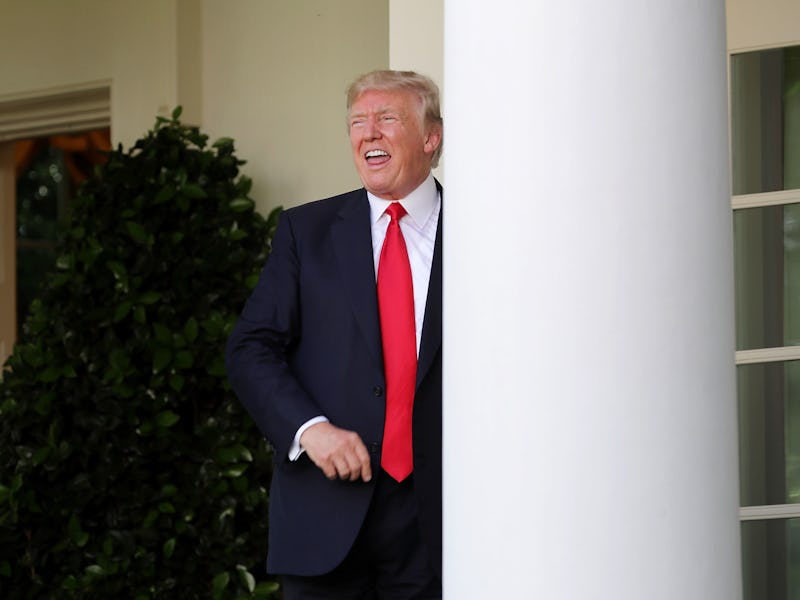Donald Trump Has No Idea What the Hell He Just Did
Trump announced he would pull America out of the Paris Agreement, and revealed how little he knows about anything.

On Thursday afternoon, the White House announced that the United States will exit the Paris Agreement. Minutes later, the man responsible for that decision took the podium in the Rose Garden explained how he was treating this seminal international policy like just some scummy real estate deal.
“In order to fulfill my solemn duty to protect America and its citizens, the United States will withdraw from the Paris climate accord,” President Donald Trump said, pausing to soak in a smattering of applause, “but begin negotiations to re-enter either the Paris Accord or an entirely new transaction.”
“If we can,” he added, “that’s great. If we can’t, that’s fine.”
He then went on to make it very clear that he has no idea what any of this means — and that’s the charitable interpretation.
To start, Trump’s speech was full of bizarrely wrong statements, like his claim that America is “the cleanest and most environmentally friendly country on Earth.”
In fact, just the opposite is true. Today, only China produces more emissions each year than the United States, and the U.S. still emits far more greenhouse gases for every one of its citizens.
More broadly, Trump claimed that Paris Agreement was “deeply unfair on the highest level” to the United States.
He says this because some countries, like India and China, get a few more years to grow their emissions and some developing countries will receive aid to help them move toward emissions cuts. The United States, on the other hand, pledged to draw down its emissions more sharply, and to pay money in to the Green Climate Fund, which supports developing nations’ emissions reductions.
The problem with this argument is that it ignores the extraordinary advantages America has already locked in through centuries of unchecked industrial expansion. Human beings have been on this planet for a few hundred thousand years, and the U.S. has been around 241 years, but the U.S. has accounted for nearly a third of the carbon emissions our species has ever produced — more than any other country in the world.
America, along with other wealthy nations, committed to sharper cuts for the simple reason that it’s easier to cut your emissions if you’ve already amassed tremendous wealth burning fossil fuels and used that wealth to build infrastructure and an economy that can support a rapid shift to renewable energy sources.
If that kind of basic infrastructure — infrastructure that takes fossil fuels to produce — doesn’t exist in a country, and if that country’s population is emerging from poverty to something resembling the kinds of wealth that exist in the United States and Europe, similarly sharp reductions are much more painful to absorb. So the reduction targets India, China, and other states from the group that get called “developing nations” brought to the table were more shallow.
Even with slower reduction targets, no country is set to catch up to the greenhouse gas load the United States and Europe have added to the planet — or the profits they’ve made building it up.
Trump thinks this all adds up to a bad deal, a “transaction” in which America comes out a loser. And he’s acting like he shrewdly spotted the mistake, as if Barack Obama and John Kerry had simply walked into a room with some savvy Chinese and Indian environmentalists and gotten fleeced.
The reality is that the United States committed to sharp emissions cuts and generous contributions to the Green Climate Fund. These were voluntary commitments. Every country’s were, though Trump seems to think America’s commitments were designed by nefarious foreign actors.
Meanwhile, the cities and workers Trump said he hopes to save by pulling out of the agreement, like “Detroit” and “coal miners,” are unlikely to see significant profits from relaxed greenhouse gas regulations. Coal was on the decline long before Paris, and there’s no evidence to suggest the agreement represents an economic threat to Americas cities.
John Kerry takes the stage to sign the Paris Agreement For Climate Change while holding his granddaughter in April 2016.
Here’s what will happen next: China, India, and Europe have pledged to move forward with emissions reductions, with or without the United States. Getting left behind, America will lose whatever moral authority or leadership role it might have claimed in the fight against climate change.
And America likely will produce more emissions, despite the efforts of certain states to stem the tide. So the planet will warm more, and Americans, along with Indian, Bangladeshi, and Chinese citizens will face the consequences.
Trump asked near the end of his speech, “At what point does America get demeaned? At what point to they start laughing at us as a country?”
Expect to see a whole lot of answers to that question soon.